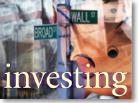|
Do you need a broker?
|
 |
December 9, 1997: 10:17 a.m. ET
The answer depends on whether you want to save money and do research
|
NEW YORK (CNNfn) -When the Dow Jones industrial average plummeted 554 points on Oct. 27, investor Phil Mauro said he didn't even bother to watch the news.
He wasn't worried about his portfolio because he pays a broker at Merrill Lynch to do the worrying for him.
"Hiring a broker was the smartest move I ever made," said Mauro, 60, president of J.V. Haring & Son, a calligraphy printing company in Staten Island. "You get what you pay for. If you don't want quality, you might as well go to Atlantic City and take your chances."
Yet having a broker isn't always a clear-cut choice today because of the evolution of discount brokerages that allow investors to do their own trades on the phone and through the Internet at cheaper prices.
"There's a place for a traditional broker who's giving advice as well as a discount brokerage," said Tom Quick, president of discount brokerage Quick & Reilly. "Different people need different things."
The traditional approach
But not everybody agrees. Stan Heilbronn, senior vice president at Merrill Lynch, thinks people need a broker more than ever today because of the volatility of the U.S. stock market and the glut of information.
"After 33 years in the industry, I am truly a source of financial planning and a provider of wisdom," Heilbronn said. "It's no different than having a good physician, a good attorney, and a good accountant."
Heilbronn recalled one friend who lost about $4,000 in electronic trading because he entered the wrong ticker symbol into the computer.
Edward Igel, a senior vice president at Salomon Smith Barney, another Wall Street titan, said his clients have access to hundreds of analysts and researchers who follow every blip in the market.
"I have to believe a professional brings something to the table," Igel said. "The markets are complicated. You don't want to wade into that without good information on your side."
'Do-it-yourselfers' save big
On the other hand, people today are taking control of their lives - especially their investments -- like never before, said Karen Askey, a vice president in electronic trading at Charles Schwab & Co. In particular, aging baby boomers have taken a "self-service" approach, she said.
Andrea Morrow, 48, a housewife from Texas, said she likes having 24-hour access to information and trades. "Back in the old days, you'd have to call your broker for information," Morrow said. "Now, I can do so much more myself."
Morrow last week bought 300 shares of Cooper Cameron Corp. (RON) at 57, and sold it Friday at $69, making a $3,600 profit.
Part of the reason people can make their own decisions with such success is that information that was once only in the hands of the big brokerages is now available on the Internet -- often for free, Askey said.
For example eSchwab offers analysts' estimates, Standard & Poor's research and other data for free on its website, Askey said.
"What Schwab tries to do is to make some sense of the information out there and provide the information you need to make decisions," Askey said.
And the difference in price can be substantial, said Blake Darcy, chief executive of DLJdirect, the electronic trading arm at investment bank Donaldson Lufkin Jenrette.
For example, on an average transaction of $10,000, the cost at a traditional brokerage would be about $230. But the price would drop to $20 at an online brokerage, Darcy said.
A review by Jupiter Communications found a significant price slashing among the online brokerages. Ameritrade Inc. has the lowest fee at $8.
Testing the waters
Darcy said many DLJdirect clients switched from full-service brokerages because they wanted to try their hand at managing their money.
"We're going through a transition," Darcy said. "There's very little you can't do online. You have the high-quality research, the screening tools, the quotes and the charts."
But the day after the stock market's huge dip, electronic trading was horribly backed up. CNNfn received more than 1,000 e-mail messages from online investors who couldn't complete trades. Darcy argues that the problems were just as bad at traditional brokerages.
"A typical broker has 200 to 400 relationships," Darcy said. "They can only talk to one person at a time. The biggest customers will be answered first and the everybody else gets in line."
No good data
The bottom line is there is no way to say whether a traditional broker or a discount service is better. There have been no studies that prove either one produces better returns, said Michael Robinson of the National Association of Securities Dealers (NASD).
Likewise, there is no data suggesting broker fraud is better or worse in any type of service, Robinson said.
Steve Eisman, a senior vice president at Oppenheimer & Co., argues the chasm between traditional and discount brokers has blurred. He said people can opt for a different alternative: hire a financial planner for a flat fee who can manage their assets and buy no-load stocks and mutual funds through discount brokers.
Schwab, for example, has a relationship with about 5,000 financial planners who use its "one-source" service with 1,400 different mutual funds, he said.
"A lot of people need advice," Eisman said. "The question is, what type of advice?"
-- By staff writer Martine Costello
|
|
|
|
|
 |

|

